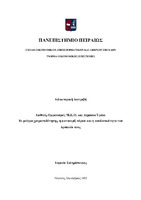Διεθνείς οργανισμοί, Μ.Κ.Ο. και δημόσια υγεία: το μείγμα χρηματοδότησης, η κατανομή πόρων και η αποδοτικότητα των δράσεών τους

View/
Keywords
Αναπτυξιακή βοήθεια στην υγεία ; Μεταδιδόμενες ασθένειες ; Δημόσια υγεία ; ΚΜΟ ; Αποδοτικότητα ; ΠροτεραιοποίησηAbstract
With health being a threatened good, in a highly globalised environment, and environmental conditions constantly changing, the study of health policies and health economics is becoming the cornerstone for the application of what the pure health sciences are discovering and researching. Global health, in the light of 'one health', is not only the concern of powerful states. Epidemic and pandemic crises are not confined to borders, reminding us that achieving universal health coverage is a costly process, and its proper implementation requires monitoring and evaluation mechanisms, both to avoid issues of mismanagement and to be able to approach interventions to achieve it efficiently, in terms of cost and impact. Development aid for health, especially for the reference region of this study (Sub-Saharan Africa), is becoming an indispensable practice, given the very low state health budgets and correspondingly low state expenditure. Especially for the communicable and reference diseases (HIV, TB and Malaria), it is considered necessary, even in cases of poor performance, both because there are no alternatives without an increase in government spending and because any reduction or termination would have disastrous results. For the extraction of results and conclusions, a three-dimensional innovative approach is used for the first time in terms of data clustering (countries, country groups, diseases) and a corresponding triple analysis approach (statistical analysis, mapping and cost-effectiveness analysis). A similar picture can be observed in the mechanisms of financial support from private initiative for civil society organisations operating in the health sector, which is drawn from the present study, and which is the first for the case of Greece. In order to avoid inefficient practices and commercialisation, it is necessary to evaluate and introduce new transparency measures for transactions between the parties involved.


